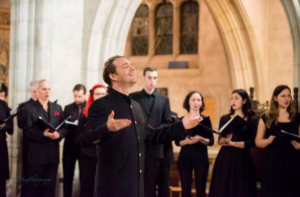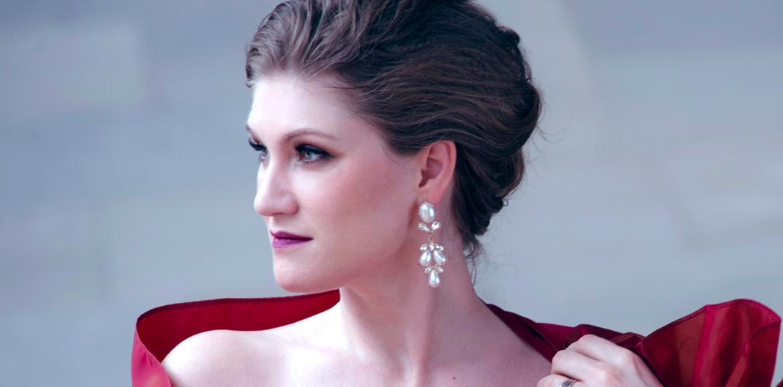Two very different headliner vocal concerts marked the first weekend of Music and Beyond 2019.
On Saturday evening at Dominion-Chalmers, Daniel Taylor and his Toronto-based Theatre of Early Music performed Handel’s Dixit Dominus, along with an assortment of Handel opera and oratorio arias and duets. On Sunday night, at First Baptist Church on Laurier, Canadian soprano Jane Archibald gave a thoughtfully curated solo recital that showed off her technical fireworks as well as her considerable interpretive gifts.
Archibald has an established opera career in Europe, where she specializes in stratospheric coloratura repertoire, and has recently started branching out into more dramatic repertoire (she brought the house down in her Mathilde in Rossini’s William Tell at Theater an der Wien in the fall). For her Ottawa concert, she selected repertoire that would allow her to flex all her performing muscles.
Archibald has an extraordinary instrument, cut from the same brilliant cloth-of-gold from the bottom to the top. The sound is brilliant, with such perfectly even production and fantastic, flexible control of dynamics and phrasing that it’s as if someone was drawing a bow across her vocal chords.
It’s not a small voice by any means, easily filling up the space. The acute notes were ultra secure and beautifully supported, although a tiny, almost imperceptible hoarseness seemed to affect the voice at this range, like there was a little bit of grit from a cold in her throat. Add to all that Archibald’s natural warmth and charisma, her expressive face, and her intelligent approach to the texts, and this was a recital that would have done justice to any concert hall in the world.
After a warmup of Purcell, Archibald really started to let things fly with the Mozart concert aria Vorrei spiegarvi, o Dio, performed with sumptuous legato, delicate shading and deep reserves of dignity and sorrow. The notorious, daredevil leap from low B to high D was smoothly negotiated.
Three Debussy songs followed, full of French with and shimmering impressionist colours (it helps to have the wonderful Liz Upchurch, head of the Canadian Opera Company’s Ensemble Studio, as your collaborative pianist). However, French was the only language in which Archibald’s diction wasn’t perfectly clear and communicative.
Schubert’s Shepherd on the Rock is so overdone that it’s easy to cringe when you see it on yet another soprano’s program. But this was the kind Shepherd one dreams about, with exquisite, chamber ensemble listening from all three musicians. Clarinettist Dominique Desautel’s opening note seemed to magically appear out of the strands of the piano chord. He then held it on the longest, most spectacularly calibrated crescendo and decrescendo I have ever head in this work.
Britten’s Illuminations, set to poems by Rimbaud, is more commonly performed by tenors, but Archibald made the case for rectifying this trend, bringing out the lush sensuality and playful, intimate nature of the music. A collection of songs by Quilter and Robbie Burns (the latter sensitively arranged by Upchurch) were sung with simplicity, affection and ample charm.
In three excerpts from Richard Strauss’ Sechs Lieder, Archibald returned to dazzling pyrotechnics. Amor had shades of Grossmächtige prinzessin–not surprisingly, since Strauss’s Zerbinetta is one of Archibald’s signature roles– with dizzying swoops and extravagant trills that effectively evoked the flitting and flirting of naughty Cupid. The Csardas from Die Fledermaus was an exuberant ending, delivered with terrific bravado. The last movement of the Schubert was repeated as an encore, along with a lilting, lullaby-like new work, the title and composer of which I failed to catch.

Daniel Taylor and the Theatre of Early Music.
The previous night, Daniel Taylor conducted Handel’s Dixit Dominus with his own hand-picked vocal and instrumental ensemble from Toronto.
The Dixit is such a dramatic, striking work that it’s easy for conductors to exploit extremes of dynamic range and tempo. Taylor’s version had nobility and plenty of vigour, but stayed well within the bounds of sane execution. The choir was undoubtedly the star: fresh, precise in its attack, with a rich, vibrant, present sound that belied its small numbers.
Three excerpts from The Ways of Zion do Mourn, Handel’s doleful anthem on the death of Queen Caroline of England, left one wanting more. Among the soloists, the superb young baritone Geoff Sirett stood out with his voice of solid oak.







